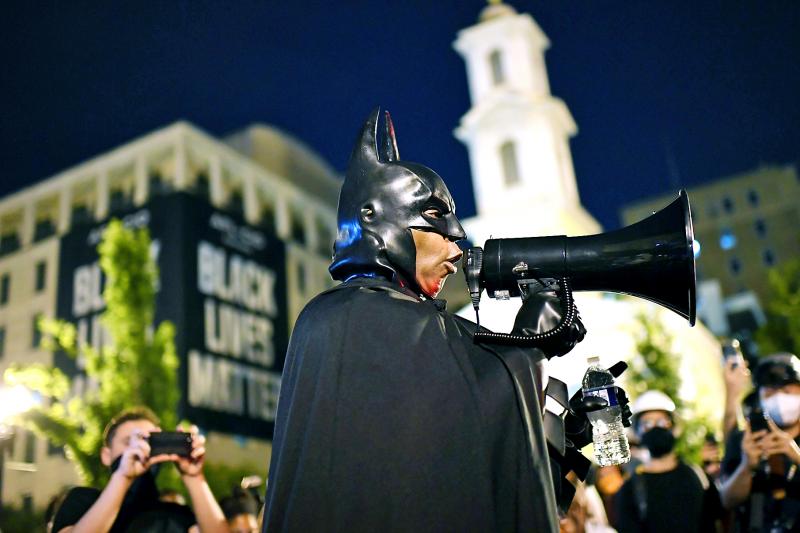When he first ran for office in 1994, they scrawled the N-word on his lawn signs. By the time he joined the US Congress, he had to unplug the telephone lines because callers brought his staff to tears.
Even after he became a US senator, the Capitol quickly became just another place where he would be stopped by the police.
Initially reluctant to focus on race, US Senator Tim Scott of South Carolina is now a leading Republican voice, teaching his party what it is like to be a black man in the US when the police lights are flashing in the rearview mirror.

Photo: AFP
He has been pulled over by law enforcement “more than 18 times,” Scott said in an interview.
“I’m thinking to myself how blessed and lucky I am to have 18 different encounters, and to have walked away from each encounter,” Scott said.
As the only black Republican in the US Senate, Scott’s role is heavy with a certain weight. He is leading a task force of Republican senators drafting the justice act, law enforcement changes set for a test vote this week, but it is also a historic opportunity to speak to Republicans about race — as a conservative, a Christian and a man from the state where the US Civil War began.
He rejects the concept of systemic racism, which puts him at odds with many black Democrats, who demand a broader police overhaul than his proposed bill. Instead, he places his faith where he says he has seen the change, in people’s hearts.
He shares his experience as a black American in the 21st century, including this year when he was pulled over for failing to signal early enough for a lane change — or, as he called it, stopped for “driving while black.”
“I just can’t imagine the pressure he must be under, though, as the only African American Republican,” said US Representative Karen Bass, chairwoman of the Congressional Black Caucus. “That he has to sit there with those senators and go through his experiences, and hope that they have some measure of empathy,” said Bass, who is leading the Democrats’ policing bill and working with Scott, whom she has known for years.
“It’s exhausting,” she said. “Racism is exhausting.”
As massive demonstrations over the May 25 killing of George Floyd in Minnesota spilled into a worldwide reckoning over police tactics and racial injustice, Scott quietly approached US Senate Majority Leader Mitch McConnell at a Republican senators’ weekly private luncheon.
Scott whispered in McConnell’s ear that he wanted a seat at the table drafting legislation.
“I’m the guy that actually has the experience,” he told McConnell.
The leader agreed.
Broaching law enforcement changes is a new priority for the Republican party, which proudly calls itself the party of former US president Abraham Lincoln, but has wrestled with race in the modern era, becoming more aligned with the “law and order” approach now embraced by US President Donald Trump than a civil rights platform.
“He’s been working for this moment his whole life,” US House of Representatives Minority Leader Kevin McCarthy said.
Scott’s family — the grandfather who picked cotton as a child and grandmother who cleaned homes, and his own parents, who separated when he was young, his father in the military, his mother working double shifts as a nursing assistant to provide for him and his brother — taught him to stay steady amid hardship.
He acknowledges in his memoir that he almost flunked his first year of high school, before going on to become senior class president and attend college.
He is among a generation of Capitol Hill Republicans — along with McCarthy and US Senator Marco Rubio, both of whom he counts as friends — who came of age during the administration of former US president Ronald Reagan, carrying a conservative’s belief in the wellspring of opportunity awaiting hard work.
Elected to the US House of Representatives on the 2010 Tea Party wave, Scott was tapped for a vacant US Senate seat in 2012 and went on to win it outright in 2014.
“He found his political legs and political wings at a unique time in this country,” said Antjuan Seawright, a Democratic strategist in South Carolina. “He was able to tap into something that was not known, so he made the unknown known, a black Republican.”
With the 2014 Missouri death of Michael Brown, and the 2015 South Carolina killing of Walter Scott, he wrote: “It was becoming harder and harder not to speak out.”
What started as a series of US Senate speeches about his experiences has led to this defining moment, drafting legislation at a time of history.
“He’s been able to diversify the conversation in America about the African American community ... and how we fit into this larger pulse of what we call America,” South Carolina African American Chamber of Commerce chairman and chief executive Stephen Gilchrist said. “And yeah, that does draw criticism because, in many respects, it does not toe the line.”
If anything, Scott objects not to those in his party learning the toll of racism, but critics from the left who question his policy decisions as a black man.
He publicly spoke out against Trump’s 2017 comments of fine people on “both sides” of the neo-Nazi protests in Charlottesville, Virginia, and has since blocked some of Trump’s judicial nominees over their views.
Scott said that he believes there is value in having the person who has “gone through the pain and the misery” of bias writing the policing bills that could become law.
“Esther 4:14 says: ‘For such a time as this,’” he said. “I think it is important that, in the history of eternity, that I had the good fortune of being born in the place where the civil war started, being elected in the seat that [former US senator] Strom Thurmond used to hold, to be in a position to have this serious conversation that confronts racial outcomes in this nation. I think it’s a blessing from God.”

‘IN A DIFFERENT PLACE’: The envoy first visited Shanghai, where he attended a Chinese basketball playoff match, and is to meet top officials in Beijing tomorrow US Secretary of State Antony Blinken yesterday arrived in China on his second visit in a year as the US ramps up pressure on its rival over its support for Russia while also seeking to manage tensions with Beijing. The US diplomat tomorrow is to meet China’s top brass in Beijing, where he is also expected to plead for restraint as Taiwan inaugurates president-elect William Lai (賴清德), and to raise US concerns on Chinese trade practices. However, Blinken is also seeking to stabilize ties, with tensions between the world’s two largest economies easing since his previous visit in June last year. At the

UNSETTLING IMAGES: The scene took place in front of TV crews covering the Trump trial, with a CNN anchor calling it an ‘emotional and unbelievably disturbing moment’ A man who doused himself in an accelerant and set himself on fire outside the courthouse where former US president Donald Trump is on trial has died, police said yesterday. The New York City Police Department (NYPD) said the man was declared dead by staff at an area hospital. The man was in Collect Pond Park at about 1:30pm on Friday when he took out pamphlets espousing conspiracy theories, tossed them around, then doused himself in an accelerant and set himself on fire, officials and witnesses said. A large number of police officers were nearby when it happened. Some officers and bystanders rushed

Beijing is continuing to commit genocide and crimes against humanity against Uyghurs and other Muslim minorities in its western Xinjiang province, U.S. Secretary of State Antony Blinken said in a report published on Monday, ahead of his planned visit to China this week. The State Department’s annual human rights report, which documents abuses recorded all over the world during the previous calendar year, repeated language from previous years on the treatment of Muslims in Xinjiang, but the publication raises the issue ahead of delicate talks, including on the war in Ukraine and global trade, between the top U.S. diplomat and Chinese

RIVER TRAGEDY: Local fishers and residents helped rescue people after the vessel capsized, while motorbike taxis evacuated some of the injured At least 58 people going to a funeral died after their overloaded river boat capsized in the Central African Republic’s (CAR) capital, Bangui, the head of civil protection said on Saturday. “We were able to extract 58 lifeless bodies,” Thomas Djimasse told Radio Guira. “We don’t know the total number of people who are underwater. According to witnesses and videos on social media, the wooden boat was carrying more than 300 people — some standing and others perched on wooden structures — when it sank on the Mpoko River on Friday. The vessel was heading to the funeral of a village chief in